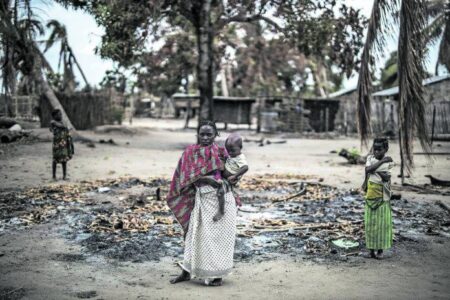
Al-Shabaab’s terror in Mozambique
The past months have witnessed an unprecedented escalation of military activity from the Islamist group known as al-Shabab in the mineral-rich province of Cabo Delgado in Mozambique.
In August the insurgents occupied the port of Mocímboa da Praia, about 100km from the natural gas extraction plant of Palma. The town was emptied of the majority of residents, and the insurgents are holding sway over its ruins.
The swathe of coastal land extending from Mocímboa to Macomia in the south is de facto controlled by the group, which rose to prominence in Mozambique at the end of 2017. Many islands in the Quirimbas archipelago — previously a thriving fishing community and tourist paradise — were also raided, their inhabitants reaching the provincial capital of Pemba by boat. This situation enabled the group to receive military supplies by sea and to recruit destitute youths into their ranks.
Meanwhile, the morale and reputation of the Mozambican army was severely damaged by leaked videos showing soldiers torturing prisoners to death. Based on the accent and dress of the perpetrators, Amnesty International indicted the government, which in turn denied responsibility and dismissed the videos first as a false flag operation and then as a “deep fake”.
In September, another video was leaked in which a group of soldiers could be seen following a naked woman along a road, later identified as the Awassi crossroad. The woman swerved away from the fateful tree that had been chosen as the site of her execution; the soldiers first flogged her and then riddled her with more than thirty bullets.
“We’ve killed an al-Shabab,” one soldier said, making a sign of victory to the cellphone camera. A number of informal explanations emerged on social media — supposedly stemming from army sources — alleging that the woman was a witch sent by the insurgents to spy or cast a spell upon the soldiers.
Again, the Mozambican army denied all involvement; but again, to most observers, the soldiers’ dress and accent unequivocally betrayed the perpetrators. Two days after the video was leaked, the death in combat of the soldier identified as the one making the victory sign was announced.
In October, some signals seemed to indicate a firmer governmental response. The commander of the rapid intervention police made an incendiary speech, spurring his unit into action. Local reports described the taking of the Awassi crossroads by war veterans led by a septuagenarian and the alleged death of 270 insurgents in the operation.
The police commander announced an insurgent base had been destroyed and weapons and cooking equipment confiscated. President Filipe Nyusi visited the province; on the island of Ibo he reassured the local population that military advances were under way. In response, an elderly man told him, in a turn of phrase that has by now become a meme: “Mr President, we don’t want support: we want peace.”
Alas, hopes of peace or even military advance were soon thwarted. The Islamic insurgents carried out forays across the border in Tanzania, allegedly to plunder ammunition. On 31 October, they attacked the district of Muidumbe in force, the heartland of the liberation struggle, which they had briefly occupied in April of this year. A sound clip recorded by a militiaman describes the beginning of the attack in detail.
According to this account, a group composed of local militias and soldiers was patrolling a lowland village when cars carrying the insurgents arrived. The local militias managed to ambush two cars, but soon ran out of bullets and had to fall back.
Source: MG





